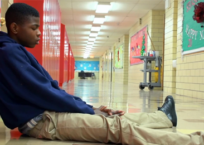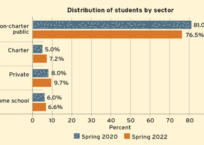
Contact Sen. Maloney and your State Senator ask them to drop this unwarranted expansion of government.
A deeply troubling bill (SB 136) has been proposed in the Illinois General Assembly by State Senator Edward D. Maloney (D-Chicago) that will affect all children in non-public schools, including home schools.
Existing school code permits the voluntary registration of non-public school students with the state. If SB 136 were to pass, it would compel all parents or legal guardians of home or privately schooled students to register with the state. Registration that is now voluntary would become compulsory. The arguments used to justify such compulsory registration are specious and reveal underlying flawed assumptions.
Sen. Maloney has expressed concern that those who homeschool their children are not accountable to anyone — and by anyone, he clearly means any government employee. Does Sen. Maloney actually believe that the state has proved itself better at educating children than parents who homeschool?
What Maloney fails to acknowledge is that many of these parents know that they are accountable to a much higher authority than the state. They know that they are accountable to God for the manner in which they educate, train, and nurture their children as well as how they steward their time, talents, and resources.
Proponents of mandatory registration fail to address the serious problem of requiring parents to register with a government entity that is actively engaged in undermining their political, moral, and theological beliefs. At significant personal costs, these families are trying through homeschooling to avoid the subversive ideological indoctrination in which many public school teachers increasingly engage.
Proponents fail to acknowledge that bias and censorship pervade public school curricula. The problems in public schools involve not merely what troubling ideas are being promoted to students but what ideas students are never exposed to because of systemic bias and censorship.
Proponents of this bill fail to address the likely, if not inevitable, slippery slope from registration to regulation. While SB 136 requires parents only to register their children with the state, it’s naïve to think that our bloated and still ravenous state bureaucracy will not expand its purview to dictate curriculum, administer tests, monitor or evaluate student progress, require certification of those who serve as teachers, and/or mandate home visits by state officials — all in the service of protecting children, of course.
Those in favor of mandatory registration fail to provide any evidence for the need for such registration. Such evidence would need to be something far more substantive than anecdotal accounts of a few homeschool parents who have failed to educate adequately their children. And such evidence would need to prove that homeschooled students are failing at higher rates than students in public schools. If there were evidence, for example, that homeschooled students have poorer test scores; higher rates of suicide or drug and alcohol use; greater involvement in gang activity; feel less safe; have lower admission rates into colleges and universities; or have lower college retention and graduation rates than public school students, then perhaps there would be a case for mandatory registration.
Since current research suggests that homeschooled students actually score higher on average than public school students, the effort to mandate registration must be driven by the baseless assumption that government bureaucrats are inherently more effective at protecting and educating children. If this assumption weren’t so gallingly presumptuous, it would be laughable.
Let’s take a moment to clarify for hubristic politicians and public educators (which does not mean all public educators) what some current research reveals about homeschooled students.
The following statistics come from a 2009 study that explored “academic outcomes of home school students attending a medium sized, doctoral institution located in the Midwest”:
Homeschool students ACT Composite score 26.5–Public school ACT Composite score 25
Homeschool students ACT Reading score 28.2–Public school ACT Reading score 25.6
Homeschool students ACT English score 27.8–Public school ACT English score 24.5
Homeschool students ACT Science score 25–Public school ACT Science score 24.5
Homeschool students ACT Math score 24.6–Public school ACT Math score 24.7The college retention rate for homeschool students was 88.6 percent as compared to 87.5 percent for public school students.
First year GPA for homeschool students was 3.41 as compared to 3.12 for public school students.
The four-year graduation rate for homeschool students was 68.7 percent as compared to 58.6 percent for public school students. (For more information on the academic success of homeschool students click HERE.)
Problems like poor test scores, high dropout rates, teenage pregnancies, teenage suicide, drug and alcohol abuse, and gang activity are not common problems within the homeschooling community as they are in many government schools. Unmotivated teachers too are uncommon among home schools.
So, Sen. Maloney believes that all homeschool and private school students in Illinois, including those who fare better than public school students, should be forced to register with the state that has demonstrably and miserably failed countless students over many years?
Has anyone calculated the additional costs to our bankrupt state that will be incurred if unwarranted compulsory state registration becomes the law for all non-public school students?
Government bureaucrats and educators like Bill Ayers and his “agents of change” see themselves as academic experts nonpareil and the ultimate protectors of children. As a result, they arrogate to themselves the right to intrude without warrant into family business.
Illinoisans should oppose this unjustifiable and needless expansion of governmental authority. This is especially important now as Illinois public schools stand poised to expand their advocacy of radical beliefs regarding homosexuality into every public elementary, middle, and high school, which IFI hopes will result in more families exiting public schools.
































